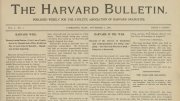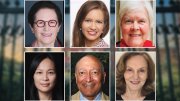The HAA Clubs and SIGs Awards recognize individual and shared-interest groups that have made exceptional contributions to their Harvard communities.
Recipients of this year’s Outstanding Alumni Leadership Award are Alice Abarbanel ’66, Louis Edozien ’81, Rume Aggreh, LL.M. ’85, and Veronica Wong ’88.
Abarbanel, of the Radcliffe Club of San Francisco, has served as the volunteer project director of the Radcliffe College Alumnae Oral History Project for four years, documenting the experiences of Radcliffe alumnae from the 1940s through 1974: from the beginning of co-educational classes with Harvard students through the merger of the Harvard and Radcliffe admissions offices (see “Reflecting on Radcliffe,” July-August 2021, page 52). The project is expected to be completed by June 2024.
Edozien and Aggreh have helped restore the Harvard Club of Nigeria, which relaunched in 2023; it represents the second-largest alumni community in Africa. By fostering a culture of trust and demonstrating a willingness to take on complex issues of registration and governance, these alumni revived a sense of unity and enhanced connections among alumni.
As activities director for the Harvard Club of Hawaii, Wong has been instrumental in spearheading numerous regional HAA events aimed at building connections to the University. She also energetically serves as an appointed HAA board director for clubs across Hawaii and Southern California.
The Outstanding Alumni Community Award honored the Harvard Alumni for Mental Health (HAMH) and the Harvard Club of Ukraine.
The HAMH SIG has made an outstanding effort to advocate for those facing stigma around the world, promote greater access to care and resources, and address the global mental-health crisis. It brings together professionals from psychiatry, psychology, social work, business, public health, and technology to host webinars and events; they plan to partner with other clubs and SIGs to co-host future events, and offer an online resource library for those seeking care.
The Harvard Club of Ukraine has shown an unflinching commitment to mobilizing the Harvard community in support of Ukraine’s people in the wake of the Russian invasion. Within hours of the attack, the club began sharing information on how to provide humanitarian support and organizing an event with firsthand updates from alumni in the conflict zone. Since then, the Club has spearheaded events—including a conversation with Ukrainian President Volodymyr Zelenskyy—all meant to keep the Harvard community informed.








